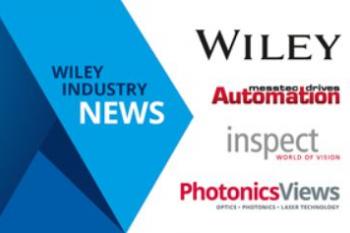PhotonicsViews 2/2023
Cover Picture: PhotonicsViews 2/2023
Editorial
Happy 20th volume anniversary!
Oliver Dreissigacker, Stephanie Nickl (Wiley VCH)
- Pages: 1
Contents: PhotonicsViews 2/2023
- Pages: 2-3
News: PhotonicsViews 2/2023
- Pages: 4-15
Products: PhotonicsViews 2/2023
- Pages: 16
Organizations & Initiatives: PhotonicsViews 2/2023
- Pages: 17-23
Communications: PhotonicsViews 2/2023
- Pages: 24-28
Congratulations
20 volumes of optics, photonics, and laser technology
- Pages: 29-31
Interviews
A kick-start for start-ups: EPIC CEO interview with Marc Ricci, general director of Pôle Optitec
Carlos Lee (EPIC)
Carlos Lee, EPIC’s director general, talks to Marc Ricci, general director of Pôle Optitec, a cluster based in southern France dedicated to innovative photonics technologies.
- Pages: 32-33
‘The Laser’ turns 50: The world’s leading trade fair and congress has brought together the international photonics industry for five decades
The Laser World of Photonics is celebrating its 50th anniversary and, for the first time, it will take place alongside Automatica, the leading exhibition for smart automation and robotics. Exhibition director Anke Odouli offers a glimpse of the innovations, key topics and highlights of the laser event.
- Pages: 34-35
The secret to success: be visionary every day!
25 years of Optisense – an interview with managing director Dr Jens Heymans
Optisense turns twenty-five and is in its prime, stating that it is the market leader in non-contact coating thickness measurement.
- Pages: 36-37
Motion control specialist for over 50 years: Aerotech’s CEO Mark Botos and president Bob Novotnak in interview
The company’s history dates back to 1970, when Stephen J. Botos and two fellow engineers started prototyping a positioning system for industrial use in a garage. The first positioning system manufactured was a simple two-axis electromechanical application. A lot has happened in the past fifty years: the former 3-man start-up has grown into a high-tech company with over 500 employees. We spoke with CEO Mark Botos and Aerotech president Bob Novotnak about the company's development into a key player in the market for high-precision positioning systems and where the journey is still heading.
- Pages: 38-40
Technology Features
Diode lasers in industry: a success story: A Laserline retrospective after 25 years in business
From the supposedly ‘better flashlight’ to high-performance systems for industrial materials processing: the diode laser has traced a remarkably successful path over the last two and a half decades. And there is still no end to this development in sight.
- Pages: 41-43
100 years of technology pioneers: How Trumpf came to the laser
Laser technology plays an important role in the history of Trumpf and to the present day, from the first laser cutting machines to lasers for EUV lithography. This is how Trumpf made the laser suitable for industry and how the high-tech company benefits today from courageous decisions
- Pages: 44-47
Silver jubilee for the Laser MicroJet: Three awards for the technology kicked off the success of start-up company Synova in 1997
Combining light and water created a hybrid method of laser machining superior to other technologies, trade-marked as Laser MicroJet. The water cools the cutting zone so that hard and brittle materials can be machined without any thermal damage.
- Pages: 48-51
Laser Sources
Holographic recordings without compromise: Tunable lasers help streamline the fabrication of holographic optical elements
Stefan Trotzky (Meta Materials) & Niklas Waasem (Hübner Photonics)
Widely tunable continuous-wave optical parametric oscillator (OPO) systems help meet the demands on holographic optical elements (HOEs) for many use cases, including head-up displays and augmented reality devices. The wide tuning range allows for direct adjustment of the replay wavelength with little to no need for modification of the holographic recording geometry. HOEs fabricated using these OPO systems in conjunction with advanced photopolymer materials offer precisely controlled replay properties and exceptional diffraction efficiency.
- Pages: 52-56
- References
Spectroscopy
Every breath you take: Laser absorption spectroscopy allows unprecedented focus on the air we breathe
Mark Naples (Umicore)
ESG. Three small letters perhaps, but they are having a huge impact on science, industry, and everyday life. In industries that operate in hazardous environments, such as oil and gas mining and refineries, those letters stand for much more than environmental, social, and governance policies. They represent a framework around which an entirely new operational structure must be built, changing every level of a business from the top down.
- Pages: 57-59
Optical Measurement Technology
Plant manufacturer integrates laser measurement technology: Körber insists on quality in the details
Production systems for the luxury food and tobacco industries are complex, achieve very high throughput rates and often run 24/7. In order to ensure the products' high quality, the Körber ‘Technologies’ division counts on seamless monitoring of the entire manufacturing process in the plant.
- Pages: 60-61
Laser Marking
Precision marking of glass with excimer lasers: Laser-generated microstructures and material modifications serve as colored marks
Jörg Meinertz, Lukas Janos Richter, Clemens M. Beckmann, and Jürgen Ihlemann (all: IFNANO)
Current laser marking of glass by CO2 lasers is mainly based on the generation of cracks or melt pits. Improved quality in the form of damage free, high contrast, and high resolution marking is possible by using deep ultraviolet emitting excimer lasers. Various methods of ablative microstructure formation or nanoparticle implantation are available to achieve colored marks on glass formed by opalescence, chemical modification, or plasmonic absorption.
- Pages: 62-65
- References
Automating serial laser processing with cobots: High-precision surface finishing in tool and mold making
No more limitations due to the character set or material properties: laser markers can label a wide variety of workpieces of different materials, quickly and durably.
- Pages: 66-67
Trends in Manufacturing
Is laser technology profitable even for small quantities?
Compact stand-alone systems for metal cutting and marking
Relying on laser technology for metal cutting or marking has many advantages in practice. The processes work without contact. This protects the processed material and the tool, because a light beam does not wear out. Also, no other processing method is as flexible in terms of shaping. Tools do not have to be changed and the workpieces do not have to be clamped in time-consuming preparation. Until now however, the high purchase prices were an obstacle to using laser technology – especially for cutting – even for smaller quantities or prototype production. But in the meantime, there are also affordable systems suitable for such applications.
- Pages: 68-70
Previews
3D-printed GRIN tools for synchrospeed polishing: A first experimental study towards the use of hardness-gradient polishing tools for micro-optics manufacturing
- Pages: 71
Measuring the thickness of thin sintered layers precisely: Considering the influence of sintering on optical constants, the thickness of sintered Al2O3 layers in quartz tubes can be accurately determined
- Pages: 71
Technology Report
The future of optical measurement technology: A review of new developments in optical metrology and industry trends in the digitalization and integration of these solutions for in situ and inline measurements
Optical metrology is one of the key technologies in today's manufacturing industry. It can be generally defined as the science of measuring with light, and it is widely used to evaluate the physical properties of products (or some of their parts or components) and to monitor large infrastructures and facilities. In this article we will review some of the current technologies for optical measurement in different manufacturing industries, the new developments and the trends related to the continuous demand for high- precision and high-efficiency solutions.
- Pages: 72-75
- References
Company Profiles: PhotonicsViews 2/2023
- Pages: 76-78
Calendar
- Pages: 79
Meetings: PhotonicsViews 2/2023
- Pages: 80-83
Buyers’ Guide
- Pages: 84-86
Index & Masthead
Company Index
- Pages: 89




